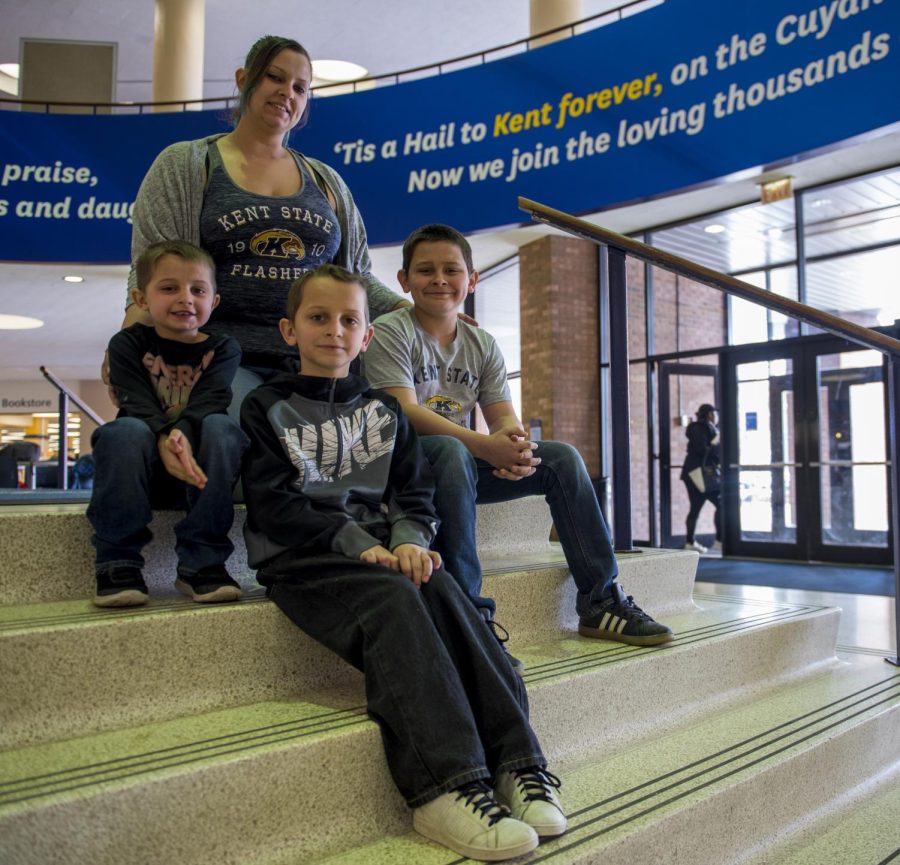Diplomas and diapers: Student moms struggle to balance school, children
Angela Jarrells and her children, from left to right, Eli, Evan and Ethan sit on the steps in the Student Center. Angela takes classes at Kent while looking after her three children.
March 21, 2018
A full workload can seem impossible when a student is juggling student loan debt and out-of-class responsibilities, but imagine raising a child at the same time.
This is a reality some students face on a daily basis.
Megan Odell-Scott experienced this firsthand when she had her daughter one year into her political science graduate program.
Now in her third year, her biggest challenge is balancing schoolwork and parenting simultaneously.
“I’m constantly working on coursework any spare time I have,” Odell-Scott said.
Whether it’s while her baby is sleeping or her husband is at work, finding time to work is the hardest part.
The high costs of day care, combined with tuition was another challenge. Although the university provides parents with some money, it was not enough to afford day care. She was forced to become a part-time student rather than a full-time student.
Odell-Scott tries to overcome the hurdles though and continues her education for herself to set an example for her daughter of educated women working toward a career and a goal.
“Just because I’m a mother doesn’t mean I should just give up,” Odell-Scott said. “Especially when you have children, you can lose your sense of self, but I am still a person apart from my child. I think going to school and working towards another degree helps me be a better mom.”
Nearly 26 percent of undergraduate college students in the U.S. have dependent children, according to a study done by the Institute for Women’s Policy Research. That’s one in four students.
At 28 years old, Angela Jarrells is not only one of those parents but is also a first-generation college student. She attends Kent State all while parenting three children, ages 10, nine and six.
Jarrells, a freshman anthropology major, waited to resume schooling until all of her kids were old enough to attend school on their own, so she could schedule her classes at the same time.
Like many mothers, however, Jarrells found that the curriculum and events on campus are aimed more toward younger students, which makes it difficult for her to find people in a similar position as her.
“Especially due to the fact that I’m a freshman,” Jarrells said. “The people I meet are usually close to graduating already.”
Still, she found resources on campus that help parents who are receiving higher education. Jarrells said the Women’s Center, the Center for Adult and Veteran Services, as well as the LIFE program (a success group for parents on campus), were helpful in her transition.
Off campus, Almuth Koby is a group leader of the La Leche League of Kent, a group that supports breastfeeding mothers through encouragement, education information.
Koby currently takes language classes on the Kent State campus to expand her abilities for when she travels.
Her five children are all teenagers and older now, but when her kids were younger, Koby and her family were on the move, in search of a permanent teaching position for her husband.
She found that no matter where she went, the group was a continuum for her because there is always a strong sense of unity between mothers.
“There’s always a mother-to-mother connection somewhere,” Koby said.
When her husband found his place teaching at Kent State, Koby started taking classes because she feels her motherhood prevented her from doing it earlier.
She said her focus on family and volunteer work was not as academically stimulating, but she was not willing to give up her free time for a degree — something she believes is more of a hardship for mothers than for fathers.
Still, she struggles most, “to not feel guilty about neglecting the class or things around the house,” Koby said. “It feels like a luxury to take a class because it takes time away from family, but it’s just a ‘me thing’ and it feels good.”
Koby said she feels lucky because mothers that are younger have to divide themselves into different parts for their children and their schoolwork.
Even though it may be difficult for mothers to go receive higher education, Odell-Scott said it’s worth it.
“The easy thing would be to throw in the towel. This is really exciting and it’s motivating in and of itself,” Odell-Scott said. “I would say if that’s what you want to do, do it. It will be hard, but we can do hard things. It will make you a better person because you’re doing something you want to do.”
Chloe Forbes is a feature writer. Contact her at [email protected].

























